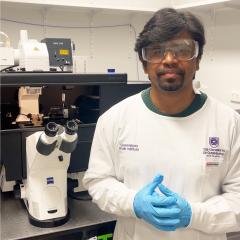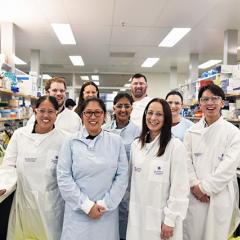The following SBMS researchers were successful in the 2016 NMDRIA grant round.
NMDRIA Grant success for Dr Karin Borges
Tltle: Triheptanoin to improve energy metabolism in MND
Recent research indicates that problems in energy metabolism contribute to disease progression in MND. Thus alternative fuel sources are a promising approach to treat MND. Triheptanoin, the triglyceride of heptanoate (a C7 fatty acid), has already been used safely for 15 years in other disorders for energy metabolism and neuromuscular disorders. In an MND mouse model it protects against motor neurone death and delays the onset of motor symptoms. We will generate more data to show that triheptanoin targets metabolic impairments that contribute to MND. These new data will be crucial to initiate large clinical trials of triheptanoin in MND.
Karin Borges, Pamela McCombe, Mark Hodson
MNDRIA Charcot Grant awarded to Dr Shyuan Ngo
This is awarded to the highest ranking grant-in-aid of all the grants submitted to MNDRIA
The project is: Metabolic exploration in neurodegenerative disease (MEND): synergy between derangements in systemic and muscle metabolism in MND.
This study will research energy needs in MND as studies have shown that people living with MND use more energy than expected.
MNDRIA Fat Rabbit MND Research grant awarded to Associate Professor Trent Woodruff
Title: Therapeutic inhibition of HMGB1 to slow disease progression in MND
This project aims to test the whether blocking a secretory pro-inflammatory mediator, HMGB1, can reduce disease progression in a mouse model of MND.
Funding for this grant was provided by the MND and ME Foundation (http://www.mndandme.com.au/) and raised through sales of Fat Rabbit books written by Wayne Patterson – who has MND. Website: http://carrottopisland.com.au/
NMDRIA Grant success for Dr Sean Millard
Title: Functional analysis of ALS candidate genes
This grant will assess whether genes associated with ALS in human genome-wide association studies (GWAS) function at the neuromuscular junction (NMJ) of Drosophila melanogaster. The majority of the genes for ALS identified to date are conserved in fruit flies making this an ideal platform for assessing what these genes do.



